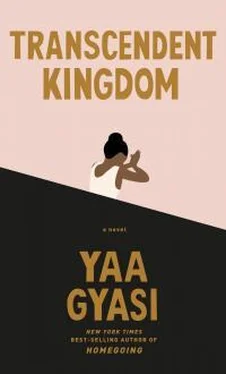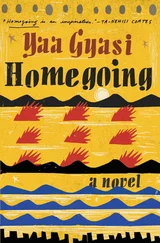“I like you best when you’re waxing rhapsodic about Jesus,” she said. “I like you best when you’re feeling holy. You make me feel holy too.”
I threw my head back and laughed.
—
A week later, the two of us borrowed one of Anne’s friends’ cars, so that we could drive to Harvard Forest in Petersham. The drive should have only taken an hour and fifteen minutes, but there was an accident on the highway and we’d crawled along in the car for two hours, just waiting for it to clear. When we finally passed by the wreckage, a hunk of metal that hardly even resembled a car anymore, I started having second thoughts about the mushrooms I’d agreed to do.
“The thing about it is, you just have to do it,” Anne said. “Like who knows what euphoria actually means until they feel it? It’s just a word.”
I mumbled noncommittedly.
“It’ll be beautiful,” Anne said. “Honestly, it’s like a religious experience. You’ll like it, I promise.”
Anne had taken a freshman seminar that spent two weekends exploring the forest, and so she knew it better than most. She guided me off trail until we found a clearing, encircled by trees that seemed to me to be improbably tall. Years later, when I got to California and set my eyes on a redwood for the first time, I thought back to the trees in Harvard Forest, their height a toddling infant compared with the giants that lived on the other side of the country.
But that day, I was impressed. Anne spread out a picnic blanket and lay on top of it for a moment, just staring up. She pulled a crumpled plastic bag from her back pocket and shook the mushrooms into her palm.
“Ready?” she asked, handing me mine. I nodded, popped a gram into my mouth, and waited for it to hit me.
I don’t know how long it took. Time stretched out before me so slowly that I felt like an hour was passing between each of my blinks. It was like my entire body was made of thread wound tightly around a spool, and as I sat there, it unspooled, centimeter by centimeter, until I was a puddle on the blanket. Beside me, Anne looked at me with such beautiful benevolence. I took her hand. We were on our backs, looking at each other, looking at the trees, while the trees looked back at us. “Living-man trees,” I said, and Anne nodded like she understood, and maybe she did.
When I came down, Anne was already there to meet me. “So?” she asked, watching me expectantly.
“I remembered this story my father used to tell my brother,” I said. “I haven’t thought about that in years.”
“What’s the story?” Anne asked, but I just shook my head. I didn’t have anything else to give. I didn’t want to tell her my stories. I couldn’t imagine living the way she lived, free, like an exposed wire ready and willing to touch whatever it touched. I couldn’t imagine being willing, and even after those few stolen moments of psychedelic transcendence, nonaddictive, harmless, and, yes, euphoric, I still couldn’t imagine being free.
—
By the end of that semester Anne and I were in the thick of a friendship so intimate it felt romantic; it was romantic. We had kissed and a little more, but I couldn’t define it and Anne didn’t care to. As her graduation loomed closer, Anne spent most of her time in my room or at the library, hunched over her MCAT practice books, her hair, still awkwardly growing out its old perm, in a disheveled topknot.
Samurai Anne I called her when I wanted to annoy her, or when I just wanted her to look up from her work and pay attention to me.
“Tell me something I don’t know about you,” she said. She took her hair down and twisted strands of it around her finger.
“Something you don’t know?”
“Yes. Please, save me from the boredom of this practice test. I might actually die if I have to do another one. Can you imagine? Death by MCAT as you strive to become a doctor.”
“I don’t have any good stories,” I said.
“So tell me a bad story,” she said.
I knew what she was doing. She was trying to get me to tell her about Nana, because while I knew all of Anne’s stories, she knew only a handful of mine, and I had always been careful to select the happy ones. She would at times try to get me to talk about him, but never directly, only in these foxy ways that I could always see right through. She would tell me stories about her sister and then look at me expectantly as though I were meant to trade. A sister story for a brother story, but I wouldn’t do it. Anne’s stories about her sister, about the parties they’d gone to, the people they’d slept with, they didn’t feel like an even trade for the stories I had about Nana. My Nana stories didn’t have happy endings. His years of partying, of sleeping around, they didn’t end with him holding down a job in finance in New York, as Anne’s sister’s did. And it wasn’t fair. That was the thing that was at the heart of my reluctance and my resentment. Some people make it out of their stories unscathed, thriving. Some people don’t.
I said, “I painted my brother’s nails once while he was sleeping, and when he woke up, he tried to wash the nail polish off in the sink. He didn’t know you needed nail polish remover, so he kept scrubbing his hands harder and harder and harder, and I was watching him, laughing. And then he turned around and punched me and I had a black eye for a week. Is that the kind of story you want to hear?”
Anne took her glasses off and put them in her hair. She closed the MCAT book. “I want to hear whatever story you want to tell,” she said.
“You’re not a doctor. You’re not my fucking therapist, Anne,” I said.
“Well, maybe you should see a therapist.”
I started laughing, a mean laugh, a laugh I’d never heard before. I didn’t know where it had come from, and when it escaped my lips, I thought, What else is inside of me? How dark is this darkness, how deep does it go?
“He died,” I said. “He died. He died. He died. That’s it. What more do you want to know?”
49
For a week in high school, I had nightmares that woke me up in a cold sweat. I couldn’t remember what happened in them, but every time I woke from one, soaked in my own fear, I would grab a notebook and try to coax the dream out onto the page. When that didn’t work, I started avoiding sleep.
I couldn’t tell my mother what was happening because I knew that she would worry and hover and pray, and I didn’t want any of those things, so instead I would say goodnight to her and head to my bedroom. I would listen for the sound of her shuffling feet to stop, and then, once I was certain that she’d fallen asleep, I would sneak back downstairs and watch television with the volume turned low.
It was hard to fight sleep, and the television, at that volume, did little to help. I’d doze off in the recliner and the nightmare would shoot me upright, awake with panic. I started praying feverishly. I would ask God to stop the dreams, and if he wouldn’t stop the dreams, I would ask that he’d at least allow me to remember them. I couldn’t stand not knowing what I was afraid of.
After a week of unanswered prayers, I did something I hadn’t done in years. I talked to Nana.
“I miss you,” I whispered into the dark of my living room, the sound of my mother’s snoring the only sound that could be heard.
“It’s been hard here,” I told him.
I asked him all kinds of things, like “What should we watch on TV tonight?” or “What should I eat?” My only rule for myself was that I could never say his name, because I felt certain that saying his name would make what I was doing real, would make me crazy. I knew it was Nana that I was talking to, but also, I knew that it wasn’t him at all, and to acknowledge that, to say his name and not have him appear before me, my fully embodied, fully alive brother, would ruin the spell. And so, I left his name out of it.
Читать дальше












